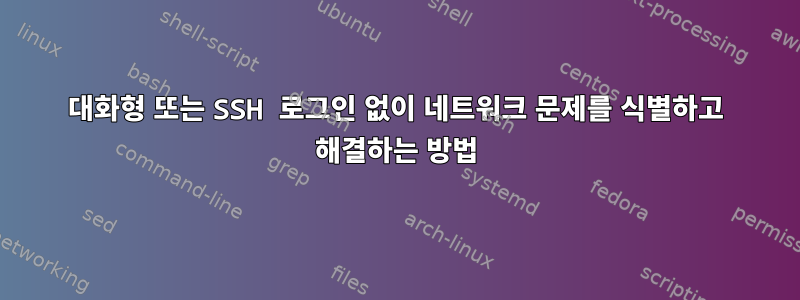
질문에 대한 답변이 맞는지 잘 모르겠으니 대안을 제시해 주시고 필요하시면 이동해주세요...
그래서 Bufallo Linkstation Pro v2 NAS를 Debian Squeeze에서 Debian Lenny로 업데이트하려고 했습니다. 나는 데비안 업그레이드 가이드를 따랐고 libav_tools의 적절한 버그를 제외하고 모든 것이 잘 작동하는 것처럼 보였지만 그것은 중요하지 않은 것 같습니다. 나는 지금은 커널을 업그레이드하지 않기로 결정했습니다(나중 단계입니다).
이제 NAS에는 디스플레이 장치도 없고 직렬 연결도 없습니다. 이 시스템에 액세스하는 유일한 방법은 SSH를 통해서입니다. 그래서 모든 것이 괜찮아 보였고 컴퓨터를 다시 시작했습니다. 부팅이 제대로 작동하고 올바른 표시등이 깜박이는 것 같지만 이제 SSH를 통해 연결할 수 없습니다.
이 NAS에 액세스할 수 있는 유일한 방법은 디스크를 제거하고 다른 컴퓨터에서 확인하는 것입니다. 시스템 로그 등을 보면 머신이 데비안을 정상적으로 부팅하고 있는 것을 알 수 있습니다. 그러나 네트워크에 문제가 발생했습니다. 다음 진단 스크립트를 실행하기 위해 crontab을 수동으로 편집했습니다.
/sbin/ifconfig
echo "---------------"
cat /etc/resolv.conf
echo "-----------------"
cat /etc/hosts
echo "-----------------"
cat /etc/netconfig
echo "----------------"
cat /etc/networks
echo "-----------------"
cat /etc/network/interfaces
echo "-----------------"
/usr/sbin/sshd -d
echo "-----------------"
netstat -tulpn
다음은 스크립트의 출력입니다.
---------------
domain Home
search Home
nameserver 192.168.1.1
-----------------
127.0.0.1 localhost
127.0.1.1 debian.Home debian
# The following lines are desirable for IPv6 capable hosts
#::1 ip6-localhost ip6-loopback
#fe00::0 ip6-localnet
#ff00::0 ip6-mcastprefix
#ff02::1 ip6-allnodes
#ff02::2 ip6-allrouters
-----------------
#
# The network configuration file. This file is currently only used in
# conjunction with the TI-RPC code in the libtirpc library.
#
# Entries consist of:
#
# <network_id> <semantics> <flags> <protofamily> <protoname> \
# <device> <nametoaddr_libs>
#
# The <device> and <nametoaddr_libs> fields are always empty in this
# implementation.
#
udp tpi_clts v inet udp - -
tcp tpi_cots_ord v inet tcp - -
udp6 tpi_clts v inet6 udp - -
tcp6 tpi_cots_ord v inet6 tcp - -
rawip tpi_raw - inet - - -
local tpi_cots_ord - loopback - - -
unix tpi_cots_ord - loopback - - -
----------------
default 0.0.0.0
loopback 127.0.0.0
link-local 169.254.0.0
-----------------
# This file describes the network interfaces available on your system
# and how to activate them. For more information, see interfaces(5).
# The loopback network interface
auto lo
iface lo inet loopback
# The primary network interface
#allow-hotplug eth0
#iface eth0 inet dhcp
auto eth0
iface eth0 inet static
address 192.168.1.150
netmask 255.255.255.0
gateway 192.168.1.1
-----------------
debug1: sshd version OpenSSH_5.5p1 Debian-6+squeeze5
debug1: could not open key file '/etc/ssh/ssh_host_rsa_key': Permission denied
Could not load host key: /etc/ssh/ssh_host_rsa_key
debug1: could not open key file '/etc/ssh/ssh_host_dsa_key': Permission denied
Could not load host key: /etc/ssh/ssh_host_dsa_key
debug1: setgroups() failed: Operation not permitted
debug1: rexec_argv[0]='/usr/sbin/sshd'
debug1: rexec_argv[1]='-d'
Set /proc/self/oom_adj from 0 to -17
socket: Address family not supported by protocol
debug1: Bind to port 22 on 0.0.0.0.
Bind to port 22 on 0.0.0.0 failed: Permission denied.
Cannot bind any address.
-----------------
(No info could be read for "-p": geteuid()=1000 but you should be root.)
Active Internet connections (only servers)
Proto Recv-Q Send-Q Local Address Foreign Address State PID/Program name
tcp 0 0 127.0.0.1:3306 0.0.0.0:* LISTEN -
tcp 0 0 0.0.0.0:111 0.0.0.0:* LISTEN -
tcp 0 0 0.0.0.0:80 0.0.0.0:* LISTEN -
tcp 0 0 0.0.0.0:60756 0.0.0.0:* LISTEN -
tcp 0 0 0.0.0.0:22 0.0.0.0:* LISTEN -
tcp 0 0 127.0.0.1:25 0.0.0.0:* LISTEN -
udp 0 0 0.0.0.0:40009 0.0.0.0:* -
udp 0 0 0.0.0.0:111 0.0.0.0:* -
udp 0 0 0.0.0.0:764 0.0.0.0:* -
udp 0 0 127.0.0.1:161 0.0.0.0:* -
udp 0 0 0.0.0.0:39720 0.0.0.0:* -
udp 0 0 127.0.0.1:809 0.0.0.0:* -
질문이 두 가지인 이유: - ifconfig가 출력을 인쇄하지 않는 이유는 무엇입니까? - 네트워크 문제를 진단하는 데 도움이 되는 cronjob을 통해 얻을 수 있는 다른 정보는 무엇이며, 대화형 셸 없이 볼 수 있는 다른 파일은 무엇입니까?
답변1
(내 댓글을 답변으로 바꿔보세요)
노력하다 /sbin/ifconfig -a. 어떤 경우에는 1) 루트가 되거나 2) -a 플래그를 제공할 때까지 ifconfig가 데이터를 표시하지 않는 문제가 발생했습니다. 이것은 내가 아는 시스템 관리자에게는 직관에 어긋나지만 어떤 경우에는 그런 것 같습니다.
라우팅 테이블을 볼 수도 있습니다 netstat -rn. 저는 데비안에 익숙하지 않지만 출력에서 해당 명령에서 무엇을 기대하는지 알 수 없습니다.
또 다른 명령은 입니다 sudo /sbin/ip a. (적어도 내 시스템에서는) 실행하려면 루트 액세스가 필요하지만 ifconfig.


